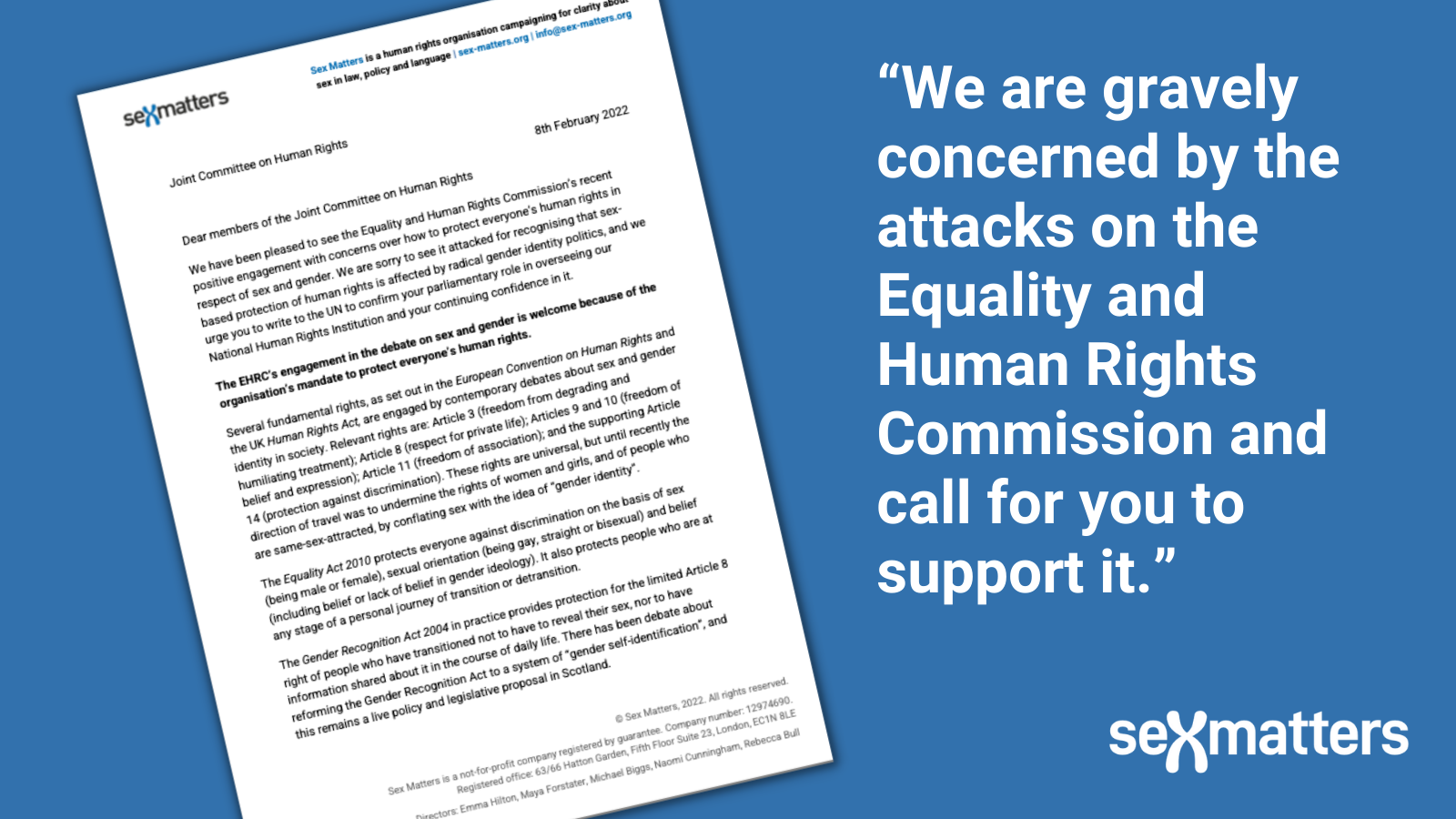Will the Joint Committee on Human Rights defend the EHRC?
Sex Matters has written to the Joint Committee on Human Rights (JCHR) to urge it to write to the United Nations to confirm its parliamentary role in overseeing the Equality and Human Rights Commission (EHRC) and stating its confidence in the EHRC, after recent attacks which have sought to undermine it.

The mandate of the EHRC is to balance everyone’s human rights, and we are glad to see it recognising that sex-based protection of human rights is affected by radical gender-identity politics. The relevant rights in the European Convention on Human Rights and the UK Human Rights Act are:
- Article 3 (freedom from degrading and humiliating treatment)
- Article 8 (respect for private life)
- Articles 9 and 10 (freedom of belief and expression)
- Article 11 (freedom of association)
- and the supporting Article 14 (protection against discrimination).
These rights have started to be undermined by conflating sex with the idea of “gender identity” and this affects women and girls, and anyone who is same-sex-attracted.
The Equality Act 2010 protects everyone against discrimination on the basis of sex, sexual orientation and belief (including belief or lack of belief in gender ideology), as well as protecting people who are at any stage of transition or detransition in gender reassignment. The Gender Recognition Act 2004 in practice provides protection for the limited Article 8 right of those people not to have to reveal their sex, nor to have information shared about it in the course of daily life. There has been debate about reforming this to allow “gender self-identification”: in Scotland this is a live policy and legislative proposal. But the interaction between these laws and the underlying human rights of all people is complex. The recent case of Forstater v CGD (in which the EHRC intervened) confirmed that:
“The GRA does not compel a person to believe something that they do not.”
In a letter to the Scottish Government, the EHRC highlighted concerns about:
“the potential consequences for individuals and society of extending the ability to change legal sex from a small defined group, who have demonstrated their commitment and ability to live in their acquired gender, to a wider group who identify as the opposite gender at a given point.”
The EHRC’s guidance on single-sex and separate-sex exceptions in the Equality Act is also badly needed, to allow everyday and specialist single-sex services.
It is also essential that digital identity information systems – especially those used by the healthcare system – are able to recognise that biological sex remains a fact of life, however people choose to identify. Forthcoming government plans to develop a digital identity and attributes framework present an opportunity to reconcile the need for accurate sex-based information with some people’s desire to express a gender identity.
The government’s current proposal to introduce criminal legislation banning conversion “talking therapies” also raises concerns that demand careful consideration. The EHRC has called for pre-legislative scrutiny, and said that:
“The legislation must be carefully drafted in order not to catch legitimate and appropriate counselling, therapy or support which enables a person to explore their sexual orientation or gender dysphoria.”
It also pointed out that:
“the legislation must define clearly what is meant by sexual orientation and being transgender.”
The Paris Principles set out international principles for national human rights institutions: their mandate must be to protect all human rights recognised in international human-rights law; they should have legal, operational, policy and financial independence from both government and NGOs, with members who exercise independent thinking and leadership. Their composition:
“shall be established in accordance with a procedure which affords all necessary guarantees to ensure the pluralist representation of the social forces (of civilian society) involved in the protection and promotion of human rights…”
Stonewall, the LGBT Foundation, the Equality Network, Mermaids, Gendered Intelligence and others have called into question the EHRC’s good standing as our national human-rights institution (read Stonewall’s response in full), and in doing so seek to bully the EHRC into continuing the one-sided engagement that characterised its approach to these issues until recently.
We note that the JCHR and and the Women and Equalities Committee unanimously approved Baroness Falkner’s appointment as Chair of the EHRC.
The EHRC is doing its job in recognising that there are complex issues at play in balancing the rights of people with different protected characteristics. We are gravely concerned by the attacks on the EHRC, and we urge the JCHR to come to its defence.
Here is the full text of our letter:
